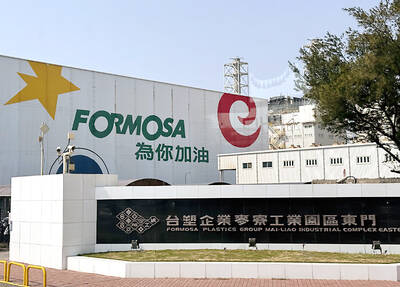MediaTek Inc (聯發科), the world’s No. 4 handset chipmaker, yesterday said it was seeing a buildup in demand this quarter, primarily from Chinese customers, which could extend into the second quarter.
Customers became very conservative about booking orders as the global economy worsened late last year, but recently they “are recovering from the psychological shock,” MediaTek chairman Tsai Ming-kai (蔡明介) told reporters on the sidelines of a conference arranged by Merrill Lynch.
“In the first quarter, handset demand in China has not been so bad, but we do not see demand in other areas,” Tsai said.
RUSH ORDERS
Helped by rush orders from Chinese customers, MediaTek last week raised its first-quarter revenues forecast. It said revenues could grow by between 8 percent and 13 percent in the quarter ending March 31, from NT$20.65 billion (US$602 million) for the fourth quarter of last year, rather than decline between 8 percent and 16 percent as estimated early last month.
The company’s business “will be slightly better than our original conservative estimate,” Tsai said. “But, visibility for the second half is very low.”
The Chinese government’s latest economic stimulus efforts to encourage private investment and consumption may only have an indirect boost on mobile phone demand, he said.
Focusing on emerging markets, MediaTek, the biggest handset chip supplier in China, reported 47 percent growth in handset chip shipments to 2.2 million units last year, helped mainly by non-brand Chinese mobile phone makers. This year, the chip company aimed to ship more.
LOW-COST PRODUCTS
Tsai said the company’s business opportunities would still come from developing countries as ultra-low-cost products such as netbooks and China’s non-brand handsets were successful last year despite the bleak economy.
He said he had faith in China’s non-brand mobile phone makers, adding that “today, [they] are non-brand players; tomorrow [they] will be the mainstream.”
Handset shipments in the BRIC (Brazil, Russia, India and China) countries may grow at a slower rate of 0.3 percent this year from last year, which is still better than the decline of between 24.6 percent and 12.4 percent in mature regions such as Japan, the US and Europe because of the severe economic downturn, market researcher International Data Corp (IDC) said.
To invest in the growing segment, MediaTek planned to ramp up production of chips used in smartphones in the second half of the year. Tsai said mobile Internet devices would be key to driving semiconductor industry growth in the future.
IDC predicted that smartphone shipments could grow by 3.4 percent annually this year, bucking the trend of an 8.3 percent decline for overall mobile phones.
MediaTek shares climbed 1.64 percent to NT$310.5 yesterday, better than the broader stock market, which rose 1.41 percent.

EXTRATERRITORIAL REACH: China extended its legal jurisdiction to ban some dual-use goods of Chinese origin from being sold to the US, even by third countries Beijing has set out to extend its domestic laws across international borders with a ban on selling some goods to the US that applies to companies both inside and outside China. The new export control rules are China’s first attempt to replicate the extraterritorial reach of US and European sanctions by covering Chinese products or goods with Chinese parts in them. In an announcement this week, China declared it is banning the sale of dual-use items to the US military and also the export to the US of materials such as gallium and germanium. Companies and people overseas would be subject to

Taiwan Semiconductor Manufacturing Co (TSMC, 台積電) founder Morris Chang (張忠謀) yesterday said that Intel Corp would find itself in the same predicament as it did four years ago if its board does not come up with a core business strategy. Chang made the remarks in response to reporters’ questions about the ailing US chipmaker, once an archrival of TSMC, during a news conference in Taipei for the launch of the second volume of his autobiography. Intel unexpectedly announced the immediate retirement of former chief executive officer Pat Gelsinger last week, ending his nearly four-year tenure and ending his attempts to revive the

WORLD DOMINATION: TSMC’s lead over second-placed Samsung has grown as the latter faces increased Chinese competition and the end of clients’ product life cycles Taiwan Semiconductor Manufacturing Co (TSMC, 台積電) retained the No. 1 title in the global pure-play wafer foundry business in the third quarter of this year, seeing its market share growing to 64.9 percent to leave South Korea’s Samsung Electronics Co, the No. 2 supplier, further behind, Taipei-based TrendForce Corp (集邦科技) said in a report. TSMC posted US$23.53 billion in sales in the July-September period, up 13.0 percent from a quarter earlier, which boosted its market share to 64.9 percent, up from 62.3 percent in the second quarter, the report issued on Monday last week showed. TSMC benefited from the debut of flagship

TENSE TIMES: Formosa Plastics sees uncertainty surrounding the incoming Trump administration in the US, geopolitical tensions and China’s faltering economy Formosa Plastics Group (台塑集團), Taiwan’s largest industrial conglomerate, yesterday posted overall revenue of NT$118.61 billion (US$3.66 billion) for last month, marking a 7.2 percent rise from October, but a 2.5 percent fall from one year earlier. The group has mixed views about its business outlook for the current quarter and beyond, as uncertainty builds over the US power transition and geopolitical tensions. Formosa Plastics Corp (台灣塑膠), a vertically integrated supplier of plastic resins and petrochemicals, reported a monthly uptick of 15.3 percent in its revenue to NT$18.15 billion, as Typhoon Kong-rey postponed partial shipments slated for October and last month, it said. The